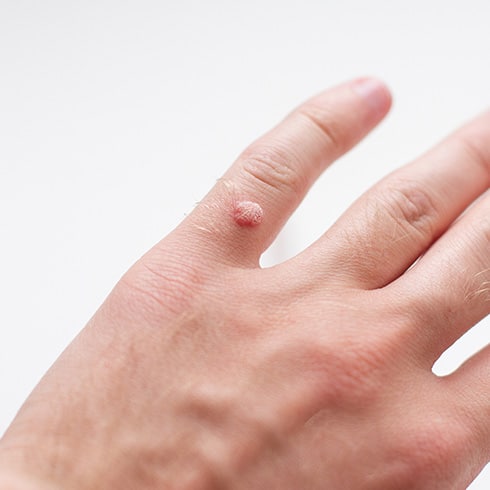What are Warts?
Warts are grainy skin growths that often occur on the fingers and hands. Common warts are caused by a virus called the human papillomavirus (HPV) and can be transmitted through touch. It may take as long as six months to develop a wart after your skin has been exposed to the virus. While common warts are usually harmless and disappear on their own, they may be bothersome or embarrassing to some.
Symptoms of common warts include:
- Fleshy, grainy bumps.
- Can be white, skin-colored, pink, or tan.
- Are rough to the touch.
- Have black pinpoints inside of them, which are clotted blood vessels.
There are also other types of warts, including plantar warts, plane warts, filiform warts, and mosaic warts. Individuals who may be at a higher risk for developing warts include children and young adults, as they may not have built up immunity to the virus yet, and people with weakened immune systems. Be sure to see a doctor right away if you have a wart that bleeds easily, causes you pain, or spreads easily to other parts of the body.
Treatment Options for Warts
Prior to treatment, Dr. Erwin will assess your wart to determine the best possible plan of action. Individuals who are bothered by their wart and wish to remove it can do so through a number of treatment options. These may include:
Cryotherapy
This involves freezing off the wart with liquid nitrogen. This will cause a blister to form under and around the art. The dead tissue will then fall off within about a week. Repeated treatments may be necessary.
Salicylic Acid
Prescription-strength wart medications with salicylic acid work by removing layers of the wart over time.
Trichloroacetic Acid or Cantharidin
For stubborn warts that do not go away with salicylic acid or cryotherapy, trichloroacetic acid may be used. The surface of the wart is first shaved away and the acid is applied with a wooden toothpick. Repeated treatments may be needed.
Bleomycin or Candida Antigen
These can be injected into the warts and will elicit an immune response that entails swelling, redness and sometimes pain.
Minor Surgery
Some warts can be cut away during minor surgery. This may leave a scar where the wart used to be.
Ideal Candidates for Wart Treatment
If you have a wart that has become painful or changed in appearance over time, has persisted despite at-home treatments, or is bothersome, you may be able to benefit from wart treatment. An assessment is required by Dr. Erwin to best determine which treatment option will be the most effective for you. If you are interested in scheduling an appointment, contact our office today!
Contact Us Today
Do you have a wart that is bothersome or unsightly? To learn more about wart treatment and if it is right for you, contact our office by calling 979-543-9933! Your first step will be to schedule an appointment with Dr. Erwin, during which she will assess your wart to determine the best treatment.

